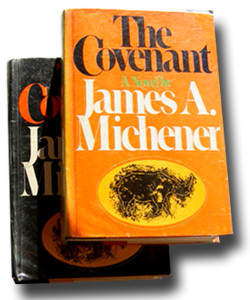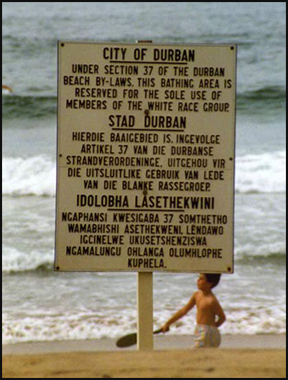 Not many American writers took up the roman-fleuve with the consistency of James Michener. His fictional characters may never have been around long enough to develop much depth, but then they didn’t get in the way of the meticulous research he put into te historical dimensions of his books. He was a master at finding the original DNA of a place and a blood line and tracing it out in a painstaking interrelated series of engaging stories as far a he could take it in his generational sagas. The Source remains on my all time favorites list. I was 22 at the time I turned its thousand or so pages. It sent me off to finally read the Bible and played a part in my decision to “fall away” from the RC Church not long after. But that was then. [1]
Not many American writers took up the roman-fleuve with the consistency of James Michener. His fictional characters may never have been around long enough to develop much depth, but then they didn’t get in the way of the meticulous research he put into te historical dimensions of his books. He was a master at finding the original DNA of a place and a blood line and tracing it out in a painstaking interrelated series of engaging stories as far a he could take it in his generational sagas. The Source remains on my all time favorites list. I was 22 at the time I turned its thousand or so pages. It sent me off to finally read the Bible and played a part in my decision to “fall away” from the RC Church not long after. But that was then. [1]
Recently I was going to South Africa, and around my second cape, the somewhat mis-named one of Good Hope. Curiously, a dozen years after its official end in South Africa it seemed a little strange to be delving into the long history of conquest, repression and genocide that led up to the official apartheid that began in 1948. It wasn’t until I returned home that the word was back in this news, this time in, of all places, the title of a new book by former president Jimmy Carter about the Israeli-Palestinian struggle, Palestine: Peace, Not Aparthied. When I first heard Carter being interviewed about the book I winced. It didn’t really seem necessary to more than imply—I haven’t yet read the book—that the Israelis were the equivalent of the Boer minority of S.A. who took advantage of the crumbling British Empire after WWII to gain the power to build a state around their longtime prejudices and fears. Carter’s title seemed a stretch, and an unfortunate one for the Noble Peace Price recipient who brought Israel and Egypt together at Camp David. Most reviewers have focused on the political/historical comparisons between S.A. and Palestine. [2] There are some that are there, at least superficially—physical separation, the domination of a minority over a majority, different intellectual-developmental traditions, superior military power and policing power of the minority state that is regarded as the interloper. Gaza might compared to Soweto. But there is a lot that doesn’t fit the history of apartheid, and unless Carter is just trying to be provocative, it seems his case might be harmed more than helped by using it.
But coming from a recent reading of The Covenant what it seems has been left out of the reviews of Carter’s book is the religious aspect in which there is another disturbing parallel. The Boers forged their racial superiority out of the Bible. Their Calvinist and French Hugenot background. Illiterate in nearly every other respect the hardy rural white settlers of S.A., fashioned for themselves a “covenant” with God out the the Old Testament (mostly Joshua) in which they were to remain separate from the “children of Ham,” and never marry with the “daughters of Caanan,” and other such proscriptions whose purposes had absolutely no reference to them. They regarded themselves as “the chosen people” of S.A., and arrogated to themselves. They were “superior” to the Bushman who were Stone Age naked nomads, and the Xhosa and the Zulu, who were primitives with often brutal social practices. These aboriginals were, of course, not Christians.
The introduction of farmers and townsmen [3] into this environment seems at first almost accidental. For some time the Cape was little more than a provisioning station for the Dutch East Indies trade in spices, and the Europeans did not venture very far northward. Africa was very much “The Dark Continent.” Interracial contact was rather minimal until settlements and growing population—and Cape Town is an impressive location for a city, with its cloud-shrouded Table Mountain as a proscenium—engendered farming in the hinterland. The land grab was on and there was plenty of trouble. The settlers, the Boers, had much smaller numbers, but better fire power, an indomitable will to prevail, and their belief in their “covenant.” The Xhosa threw themselves into the gunfire with almost suicidal frenzy, but the Zulu, who were united for a while under king Shaka, were formidable in their numbers and in their fear-instilling tactics, chanting, stomping, and banging their spears against their shields. Much of the lore of the Boers and their pantheon of bearded heroes in floppy hats was forged in these wars.
There is much that can be said for the beauty and attractiveness of South Africa with some of the most dramatic landscape on the planet. But gold and diamonds are more attractive, certainly to the British and the likes of their great imperial-commercial-conquerors like Cecil Rhodes. [4] Eventually this resulted in the Boer Wars, brutal and protracted struggles that were fought with the Orange Free State and the Transvaal republic and which the Boers eventually lost. There is a lot of ugly history both in the battles [5] and in, for example, the concentration camps that were set up by the British.
The British also played their part in the eventual establishment of apartheid , when the Afrikaners took control of the government in 1948. The Dutch word for “apartness” installed laws and practices of separation between whites, blacks (often called, pejoratively, by the “K” word, kaffirs ) that would have warmed the hearts of Strom Thurmond and Trent Lott. That ugly history lasted until 1994, when the whites of S.A. and others, wondered whether the long oppressed Black Africans would take revenge for having been herded into squalid townships, abused, imprisoned, discriminated against and otherwise treated in a manner that would have warmed the hearts of Strom Thurmond and Trent Lott.
The rest of the history, from the end of apartheid , the installation of democracy, and Nelson Mandela and Bishop Desmond Tutu, we know much better. It’s the new S.A., still with plenty of problems, but trying to find ways to live by Rodney King’s dictum. [6] S.A. is searching for a new, secular, covenant, with itself, without apartheid. They probably didn’t like Jimmy Carter reminding people about it. But then, we shouldn’t forget, either.
 ___________________________________
___________________________________
©2006, James A. Clapp (UrbisMedia Ltd. Pub. 12.16.2006)
[1] I read several other of his books, especially enjoying Tales of the South Pacific, Hawaii, andPoland. I seemed to have little interest in the ones set in America.
[2] See also, Michael Kinsley’s review of Carter’s book in [http://www.washingtonpost.com/wp-dyn/content/article/2006/12/11/AR2006121101225.html?referrer=emailarticle]
[3] It is noteworthy that, originally as a locations fort ports cities, many of the townspeople who settled in Cape Town and other coastal cities were Malays, Indians, and Indonesians, and other “colored” peoples from the archipelagos of South Asia who became the category of “coloreds” under apartheid.
[4] Perhaps, in returning to the comparison with Carter’s book, these mineral riches are the equivalent of the metaphysical riches of the “Holy Land.”
[5] See, in this Journal No. 36. 2: Breaker Morant.
[6] “People, I just want to say, you know, can we all get along?”
